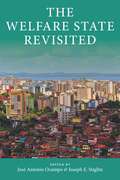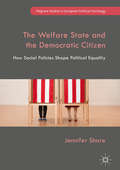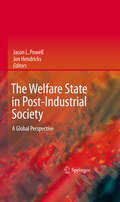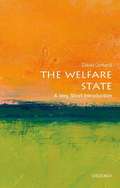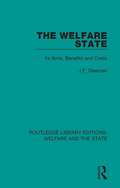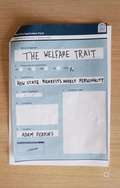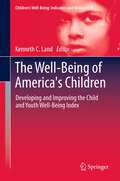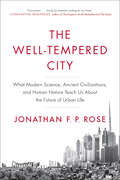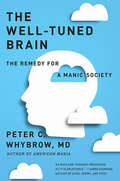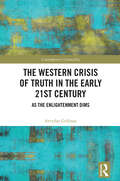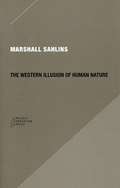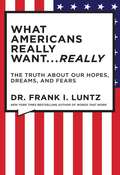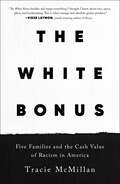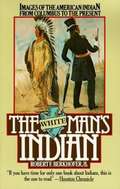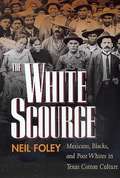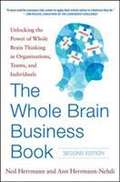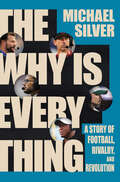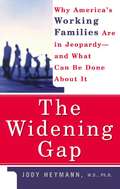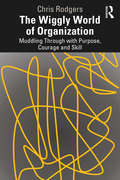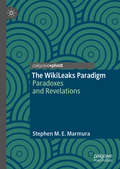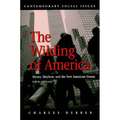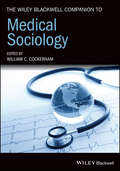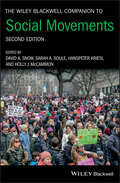- Table View
- List View
The Welfare State Revisited (Initiative for Policy Dialogue at Columbia: Challenges in Development and Globalization)
by Joseph E. Stiglitz José Antonio OcampoThe welfare state has been under attack for decades, but now more than ever there is a need for strong social protection systems—the best tools we have to combat inequality, support social justice, and even improve economic performance. In this book, José Antonio Ocampo and Joseph E. Stiglitz bring together distinguished contributors to examine the global variations of social programs and make the case for a redesigned twenty-first-century welfare state.The Welfare State Revisited takes on major debates about social well-being, considering the merits of universal versus targeted policies; responses to market failures; integrating welfare and economic development; and how welfare states around the world have changed since the neoliberal turn. Contributors offer prescriptions for how to respond to the demands generated by demographic changes, the changing role of the family, new features of labor markets, the challenges of aging societies, and technological change. They consider how strengthening or weakening social protection programs affects inequality, suggesting ways to facilitate the spread of effective welfare states throughout the world, especially in developing countries. Presenting new insights into the functions the welfare state can fulfill and how to design a more efficient and more equitable system, The Welfare State Revisited is essential reading on the most discussed issues in social welfare today.
The Welfare State and the Democratic Citizen: How Social Policies Shape Political Equality (Palgrave Studies in European Political Sociology)
by Jennifer ShoreThis book examines the ways in which the welfare state impacts levels and distributions of political participation and democratic support in Western democracies. Going beyond the traditional contextual accounts of political behaviour, which primarily focus on political institutions or the socio-economic climate, this book looks specifically at the impact of public policy on a variety of political behaviours and attitudes. Drawing on the theoretical insights from the policy feedback approach, the author argues and empirically demonstrates that generous social policy offerings can not only foster democratic citizenship by promoting a more inclusive political culture, but are most beneficial to citizens who are otherwise excluded from political life in many other societies. This book will appeal most to scholars in the fields of political science and sociology who are especially interested in the welfare state, public policy, political sociology, and inequality.
The Welfare State in Post-Industrial Society
by Jon Hendricks Jason L. PowellIn recent years, major social forces such as: ageing populations, social trends, migration patterns, and the globalization of economies, have reshaped social welfare policies and practices across the globe. Multinational corporations, NGOs, and other international organizations have begun to influence social policy at a national and local level. Among the many ramifications of these changes is that globalizing influences may hinder the ability of individual nation-states to effect policies that are beneficial to them on a local level. With contributions from thirteen countries worldwide, this collected work represents the first major comparative analysis on the effect of globalization on the international welfare state. The Welfare State in Post-Industrial Society is divided into two major sections: the first draws from a number of leading social welfare researchers from diverse countries who point to the nation-state as case studies; highlighting how it goes about establishing and revising social welfare provisions. The second portion of the volume then moves to a more global perspective in its analysis and questioning of the impact of globalization on citizenship, ageing and marketization. The Welfare State in Post-Industrial Society seeks to encourage debate about the implications of the most pressing social welfare issues in nation-states, and integrate analyses of policy and practice in particular countries struggling to provide social welfare support for their needy populations.
The Welfare State: A Very Short Introduction (Very Short Introductions)
by David Garland<p>Welfare states vary across nations and change over time. And the balance between markets and government; free enterprise and social protection is perennially in question. But all developed societies have welfare states of one kind or another - they are a fundamental dimension of modern government. And even after decades of free-market criticism and reform, their core institutions have proven resilient and popular. <p>This Very Short Introduction describes the modern welfare state, explaining its historical and contemporary significance and arguing that far from being 'a failure' or 'a problem', welfare states are an essential element of contemporary capitalism, and a vital concomitant of democratic government. In this accessible and entertaining account, David Garland cuts through the fog of misunderstandings to explain in clear and simple terms, what welfare states are, how they work, and why they matter.</p>
The Welfare State: Its Aims, Benefits and Costs (Routledge Library Editions: Welfare and the State #18)
by J.F. SleemanOriginally published in 1973, The Welfare State traces the historical roots of the Welfare State and considers the problems to which it gives rise, especially in the allocation of resources. It focuses on the economic issue of meeting needs with scarce resources and compares the British experience with that of other countries. It sets out the pattern of the social services since Beveridge and summarises the criticisms levelled at them. It considers the economic issues involved and provides a straightforward presentation of the available policy choices, the discussion poses a direct comparison with other countries. The book offers an overall conspectus of current policy issues against the historical background from which they arise.
The Welfare Trait: How State Benefits Affect Personality
by Adam PerkinsThe welfare state has a problem: each generation living under its protection has lower work motivation than the previous one. In order to fix this problem we need to understand its causes, lest the welfare state ends up undermining its own economic and social foundations. In The Welfare Trait, award-winning personality researcher Dr Adam Perkins argues that welfare-induced personality mis-development is a significant part of the problem. In support of his theory, Dr Perkins presents data showing that the welfare state can boost the number of children born into disadvantaged households, and that childhood disadvantage promotes the development of an employment-resistant personality profile, characterised by aggressive, antisocial and rule-breaking tendencies. The book concludes by recommending that policy should be altered so that the welfare state no longer increases the number of children born into disadvantaged households. It suggests that, without this change, the welfare state will erode the nation's work ethic by increasing the proportion of individuals in the population who possess an employment-resistant personality profile, due to exposure to the environmental influence of disadvantage in childhood.
The Well-Being of America's Children
by Kenneth C. LandIn 1998, the Foundation for Child Development (FCD) provided Kenneth Land a grant to explore the feasibility of producing the first national composite index of the status of American children that would chart changes in their well-being over time. Important questions needed to be answered: was it possible to trace trends in child and youth well-being over several decades? Could such an index provide a way of determining whether the United States was making progress in improving its children's lives? The Index of Child and Youth Well-Being (CWI) was born from these questions. Viewing the CWI trends from 1975 to present, there is evidence that the well-being of American children lags behind other Western nations. As conditions change, it is clear that the index is an evolving and rich enterprise. This volume attests to that evolution, and what the CWI promises for understanding the progress - or lack of progress - in enhancing the life prospects of all American children.
The Well-Being of the Elderly in Asia: A Four-Country Comparative Study
by Albert I. HermalinThe past two decades have witnessed rapid social, economic, and demographic change in East and South-East Asia. The older populations in these regions have been increasing faster than in the West, and the proportions of people over sixty will more than double over the next thirty years. Increased urbanization and educational levels and a strong shift to professional, technical, manufacturing, and service occupations are changing the social and economic landscape, leading to concern for the well-being of the elderly, who traditionally have relied on the family for support. Governments are attempting to preserve these traditions while taking into account widespread family change and new expectations for pension, health insurance, and other public programs. The contributors to this volume use survey and other data collected over ten years to examine the well-being of the current older population in four Asian countries: The Philippines, Singapore, Taiwan, and Thailand. Each major analytic chapter looks at a key dimension of well-being--economic, physical and mental health, work and leisure--and how these are affected by the familial and social support arrangements, as well as age, gender, education, and urban-rural residence. Where possible, changes over time are traced. Explicit attention is given to the policies and programs in place and under development in each country and to the cultural accommodations underway. The contributors also look ahead to the implications of the large numbers of elderly with very different characteristics who will predominate in the coming years and to the policy implications of this coming transformation. The book will be important for scholars and policymakers whose work involves population in Asia, including demographers, sociologists, and economists.
The Well-Tempered City: What Modern Science, Ancient Civilizations, and Human Nature Teach Us About the Future of Urban Life
by Jonathan F. Rose“A thorough education in how to move from simply maximizing the economic output of cities to improving the well-being of all urban residents.” —Daniel L. Doctoroff, CEO, Sidewalk Labs2017 PROSE Award Winner: Outstanding Scholarly Work by a Trade Publisher Cities are birthplaces of civilization; centers of culture, trade, and progress; cauldrons of opportunity—and the home of eighty percent of the world’s population by 2050. As the twenty-first century progresses, metropolitan areas will bear the brunt of global megatrends such as climate change, natural resource depletion, population growth, income inequality, mass migrations, education and health disparities, among many others. In The Well-Tempered City, Jonathan F. P. Rose—the man who “repairs the fabric of cities”—distills a lifetime of interdisciplinary research and firsthand experience into a five-pronged model for how to design and reshape our cities with the goal of equalizing their landscape of opportunity. Drawing from the musical concept of “temperament” as a way to achieve harmony, Rose argues that well-tempered cities can be infused with systems that bend the arc of their development toward equality, resilience, adaptability, well-being, and the ever-unfolding harmony between civilization and nature. These goals may never be fully achieved, but our cities will be richer and happier if we aspire to them, and if we infuse our every plan and constructive step with this intention. A celebration of the city and an impassioned argument for its role in addressing the important issues in these volatile times, The Well-Tempered City is a reasoned, hopeful blueprint for a thriving metropolis—and the future.“A thought-provoking introduction to the future of cities.” —Publishers Weekly
The Well-Tuned Brain: Neuroscience and the Life Well Lived
by Peter C. WhybrowIn this optimistic and inspiring book, Peter Whybrow, the prize-winning author of American Mania, returns to offer a prescription for genuine human progress. The Well-Tuned Brain is a call to action. Swept along by the cascading advances of today's technology, most of us take for granted that progress brings improvement. Despite spectacular material advance, however, the evidence grows that we are failing to create a sustainable future for humanity. We are out of tune with the planet that nurtures us. Technology itself is not the problem, as Whybrow explains, but rather our behavior. Throughout its evolution the ancient brain that guides us each day has been focused on short-term survival. But fortunately we are intensely social creatures. Without the caring behaviors that flow from intimate attachments to others, we would be relying on a brain that is only marginally adapted to the complexity of the problems we must now face together. Today we must grapple with survival, not in its immediacy but over the long term. The first step in finding our way forward is to reexamine who we are as creatures of this planet. To this end, Whybrow takes us on a fascinating tour of self-discovery, drawing extensively upon his decades of experience as a psychiatrist and his broad knowledge of neuroscience and human behavior. Illustrated throughout with engaging personal stories, the book's trove of cutting-edge science is enriched by philosophical, historical, and cultural perspectives. What emerges is a summons to rediscover the essential virtues of earlier nurturing, of mentored education, and an engagement with the natural world through curiosity and imagination. Neuroscience can open the search for a better future. But technology alone will not save us. To achieve success we will need the strength and wisdom of our better nature as humane social beings.
The Western Crisis of Truth in the Early 21st Century: As the Enlightenment Dims (Contemporary Liminality)
by Arvydas GrišinasThe Western Crisis of Truth in the Early 21st Century explores the symbolic, experiential, and associative side of contemporary political culture, arguing that phenomena such as ‘post-truth’, digitalization, mediatization, propaganda, illiberalism, or populism, far from being curiosities, have in fact come to represent a uniform aspect of political culture – a challenge to the ‘enlightened’, ‘developed’, and ‘progressive’ world that we believed ourselves to be inhabiting.Through analyses of visual and textual material such as internet memes, academic discourse, news articles, videos, and other media, it considers truth-making in the epoch of Russia’s war in Ukraine, Donald Trump, the hyper-rationalist ritualism of managing the COVID-19 pandemic and the shifting realities on the Eastern border of the West, in order to shed light on the transfiguration of the western intellectual tradition by the global political, technological, and intellectual dynamics of a world that is far from approaching the end of history. Asking what is to be done in the face of this new reality, The Western Crisis of Truth in the Early 21st Century considers whether the dissident literature of Central and Eastern Europe, which has already lived through a period of disenlightenment under the Soviet Union, as well as other Eastern European movements of dignity and independence might offer answers.A study of the dimming of the Enlightenment, this volume will appeal to scholars of social and political theory and political anthropology.
The Western Illusion of Human Nature: With Reflections on the Long History of Hierarchy, Equality, and the Sublimation of Anarchy in the West, and Comparative Notes on Other Conceptions of the Human Condition
by Marshall SahlinsReflecting the decline in college courses on Western Civilization, Marshall Sahlins aims to accelerate the trend by reducing "Western Civ" to about two hours. He cites Nietzsche to the effect that deep issues are like cold baths; one should get into and out of them as quickly as possible. The deep issue here is the ancient Western specter of a presocial and antisocial human nature: a supposedly innate self-interest that is represented in our native folklore as the basis or nemesis of cultural order. Yet these Western notions of nature and culture ignore the one truly universal character of human sociality: namely, symbolically constructed kinship relations. Kinsmen are members of one another: they live each other's lives and die each other's deaths. But where the existence of the other is thus incorporated in the being of the self, neither interest, nor agency or even experience is an individual fact, let alone an egoistic disposition. "Sorry, beg your pardon," Sahlins concludes, Western society has been built on a perverse and mistaken idea of human nature.
The What Americans Really Want...Really: The Truth About Our Hopes, Dreams, and Fears
by Dr. Frank LuntzNo one in America has done more observing of more people than Dr. Frank I. Luntz. From Bill O'Reilly to Bill Maher, America's leading pundits, prognosticators, and CEOs turn to Luntz to explain the present and to predict the future. With all the upheavals of recent events, the plans and priorities of the American people have undergone a seismic shift. Businesses everywhere are trying to market products and services during this turbulent time, but only one man really understands the needs and desires of the New America. From restaurant booths to voting booths, Luntz has watched and assessed our private habits, our public interests, and our hopes and fears. What are the five things Americans want the most? What do they really want in their daily lives? In their jobs? From their government? For their families? And how does understanding what Americans want allow businesses to thrive? Luntz disassembles the preconceived notions we have about one another and lays all the pieces of the American condition out in front of us, openly and honestly, then puts the pieces back together in a way that reflects the society in which we live. What Americans Really Want...Really is a real, if sometimes scary, discussion of Americans' secret hopes, fears, wants, and needs. The research in this book represents a decade of face-to-face interviews with twenty-five thousand people and telephone polls with one million more, as well as the exclusive, first-ever "What Americans Really Want" survey. What Luntz offers is a glimpse into the American psyche, along with analysis that will rock assumptions and right business judgment. He proves that success in virtually any profession demands that we either understand what Americans really want, or suffer the consequences. Praise for Frank Luntz: "When Frank Luntz invites you to talk to his focus group, you talk to his focus group."--President Barack Obama, spoken on June 28, 2007, to a PBS-sponsored focus group following the Democratic presidential debate at Howard University "Frank Luntz understands the American people better than anyone I know."--Newt Gingrich, former Speaker of the House "The Nostradamus of pollsters."--Sir David Frost "America's top companies listen to Frank Luntz because he understands what customers want and what employees think. He has a keen sense of the American psyche and an outstanding command of language that empowers and persuades."--Thomas J. Donohue, President & CEO, U.S. Chamber of Commerce
The White Bonus: Five Families and the Cash Value of Racism in America
by Tracie McMillanA genre-breaking work of journalism and memoir that tallies the cash benefit—and cost— of racism in AmericaThis unflinching book from award-winning investigative reporter Tracie McMillan examines what white privilege delivers—in dollars and cents—not only to white people of wealth but also to white people from the poor to the middle class. McMillan begins with her own downwardly mobile middle-class family and takes us through a personal history marked with abuse, illness, and poverty, while training her journalistic eye on the benefits she saw from being white. McMillan then alternates her story with profiles of four other white subjects, millennials to baby boomers, from across the United States. For readers of Stephanie Land’s Maid, Heather McGhee’s The Sum of Us, and Clint Smith’s How the Word Is Passed, McMillan brings groundbreaking insight into how, and to what degree, white racial privilege builds material advantage across class, time, and place. Rather than analyzing racism as a thing that gives less to people of color, McMillan studies how it gives more to people who are white—including, with uncommon honesty, herself—and how it takes so much from so many. The unforgettable follow-up question thrums steadily through this book: Do white Americans believe that racism is worth what it costs all of us?
The White Man's Indian: Images of the American Indian from Columbus to the Present
by Robert F. BerkhoferColumbus called them "Indians" because his geography was faulty. But that name and, more importantly, the images it has come to suggest have endured for five centuries, not only obscuring the true identity of the original Americans but serving as an ideological weapon in their subjugation. Now, in this brilliant and deeply disturbing reinterpretation of the American past, Robert Berkhofer has written an impressively documented account of the self-serving stereotypes Europeans and white Americans have concocted about the "Indian": Noble Savage or bloodthirsty redskin, he was deemed inferior in the light of western, Christian civilization and manipulated to its benefit. A thought-provoking and revelatory study of the absolute, seemingly ineradicable pervasiveness of white racism, The White Man's Indian is a truly important book which penetrates to the very heart of our understanding of ourselves.
The White Scourge: Mexicans, Blacks, and Poor Whites in the Cotton Culture
by Neil FoleyA powerful, award-winning work of social history about race, class and labor in Texas from post-civil war to the Depression.
The White Welfare State: The Racialization of U.S. Welfare Policy
by Deborah E. WardThe White Welfare State challenges common misconceptions of the development of U.S. welfare policy. Arguing that race has always been central to welfare policy-making in the United States, Deborah Ward breaks new ground by showing that the Mothers' Pensions--the Progressive-Era precursors to modern welfare programs--were premised on a policy of racial discrimination against blacks and other minorities. Ward's rigorous and thoroughly documented analysis demonstrates that the creation and implementation of the mothers' pensions program was driven by debates about who "deserved" social welfare and not who needed it the most. "In The White Welfare State, Deborah Ward assembles a powerful array of documentary and statistical evidence to reveal the mechanisms, centrality, and deep historical continuity of racial exclusion in modern 'welfare' provision in the United States. Bringing unparalleled scrutiny to the provisions and implementation of state-level mothers' pensions, she argues persuasively that racialized patterns of welfare administration were firmly entrenched in this Progressive Era legislation, only to be adopted and reinforced in the New Deal welfare state. With rigorous and clear-eyed analysis, she pushes us to confront the singular role of race in welfare's development, from its early 20th-century origins to its official demise at century's end." --Alice O'Connor, University of California at Santa Barbara. "This is a richly informative and arresting work. The White Welfare State will force a reevaluation of the role racism has played as a fundamental feature in even the most progressive features of the American welfare state. Written elegantly, this book will provoke a wide-ranging discussion among social scientists, historians, and students of public policy." --Ira Katznelson, Ruggles Professor of Political Science and History, Columbia University. "This book offers an original and absorbing account of early policies that shaped the course of the American welfare state. It extends yet challenges extant interpretations and expands our understanding of the interconnections of race and class issues in the U. S. , and American political development more broadly." --Rodney Hero, University of Notre Dame.
The Whole Brain Business Book: Unlocking the Power of Whole Brain Thinking in Organizations and Individuals
by Ned Herrmann Ann Herrmann-Nehdi<p>If you think your business can’t get any better, think again. Thanks to the power of Whole Brain® Thinking, you can apply what we know about thinking and the brain to transform your organization at every level. Whether you’re struggling to keep up with a changing market, stuck with a tired business model, or challenged by difficult colleagues, the proven methods in this updated guide will help you. <p>This revised and expanded edition features the latest brain research, updated real-world examples, and more actionable content than ever before. In addition to new stories, data and “mind-hacks”, you’ll find Herrmann’s timeless tips for getting unstuck, identifying the four thinking preferences, and applying research-based techniques that have been proven to work in any business environment around the world. By building and strengthening your thinking agility, you’ll be able to work more effectively with others―and leverage the best thinking around―so you can avoid costly delays, missed opportunities, and other business risks. Using the book’s point-by-point action steps, insightful case studies, and emerging thought trends, you can really put your mind to work―and get brilliant results. <p>The Whole Brain Business Book will help optimize your management approach, align your organization and strategy, and fully engage your own brain as well as the brains of others to work smarter, faster, and better than you ever thought possible.</p>
The Why Is Everything: A Story of Football, Rivalry, and Revolution
by Michael SilverFrom an award-winning journalist, the inside story of the brilliant, hypercompetitive young coaches who threw out decades of received wisdom to fundamentally remake America’s most popular sport. When Kyle Shanahan became the NFL’s youngest offensive coordinator in 2008, he had one prevailing rule: Tell me the why. If a colleague couldn’t justify his position by providing the unassailable reasoning behind it, he was told to get the hell out of Shanahan’s office. Shanahan and the members of his coaching tree—including Sean McVay, Mike McDaniel, Raheem Morris, and Matt LaFleur—came up in a sport where innovation was the exception, not the rule. There had been brilliant football minds before, from Paul Brown to Bill Walsh to Bill Belichick. But for the most part, coaches learned a particular system and stuck to it no matter what—no matter the players on their team, no matter what the opponent might do. This group of young coaches would change all that. The Why Is Everything is the story of old dogmas falling before astonishingly creative new strategies and game plans. Drawing on unmatched access across the league, longtime NFL reporter Mike Silver takes us into the key moments in this still-unfolding revolution, from the education of Mike Shanahan, Kyle’s father and a two-time Super Bowl champion, in the 1980s; to the Washington Redskins’ football laboratory in the early 2010s, where the coaches first worked together, shocking the league with their cutting-edge scheme for rookie quarterback Robert Griffin III; to McVay’s Super Bowl victory in 2022 and Kyle Shanahan’s Super Bowl agony in 2019 and 2024. Less than a decade after their emergence, these men are the stars of their profession and have helped propel the NFL to new heights of viewership and drama. With The Why Is Everything, Silver reveals how it all happened, and in the process gives us a timeless account of friendship, rivalry, and the never-ending pursuit of perfection.
The Widening Gap
by Jody HeymannThis hard-hitting book draws on the first systematic national research on how the need to meet family obligations is affecting working Americans of all social classes and ethnic groups. What happens when kids get sick? When an elderly parent is hospitalized? How do poor families cope with work-family demands? Jody Heymann's research points to a widening gap between working families and the health and development of children. Outdated labor policy and practice must be brought into the twenty-first century, argues Heymann. To do less is to abandon the precepts of equal opportunity on which America is founded.
The Wiggly World of Organization: Muddling Through with Purpose, Courage and Skill
by Chris RodgersThe well-ordered, fully aligned view of organization and management practice, with its unfailingly positive results, bears little relationship to the world that managers and others experience every day. This straight-line, ‘do this and you’ll get that’ idealization is far removed from the wiggly reality. Despite this, the former continues to dominate the ways in which management is spoken about and judged in formal organizational arenas and wider society. This creates unrealistic expectations of what managers (from CEO to the front line) can sensibly achieve independently of the actions of others. Crucially, too, it distorts the ways in which they and others account formally for their actions. And so, the fantasy continues. Against this background, the book offers a radically different way of thinking about, and engaging with, the irreducible complexity of organization and management practice. Using straightforward language throughout, it sets out to help managers and others to become consciously aware of what they already know deep down about how organization works and what they – and everyone else – are actually doing in practice. It then offers a practical approach to everyday practice that takes complexity seriously. Armed with these new insights, readers will be better placed to apply their innate understanding and practical judgement to the demands that they and others face day to day. Whether these arise from their roles as managers, other practitioners, policy makers, regulatory authorities, or participants more generally.
The WikiLeaks Paradigm: Paradoxes and Revelations
by Stephen M. MarmuraWikiLeaks poses a unique challenge to state and commercial institutions. This book considers the whistleblower platform’s ongoing importance, focusing on the informational and communicative paradoxes it faces, and the shifting strategies it has adopted over time. Attention to these matters provides insight into the nature of the contemporary networked, post-truth media environment, and the types of factors likely to affect the success of activist groups today. Chapter 1 introduces WikiLeaks’ significance as a novel expression of counterpower, outlining the disclosures marking its career. Chapters 2 through 4 address the dilemmas confronting WikiLeaks in its attempts to engage the public with and without the cooperation of mainstream news organizations. Chapter 5 appraises how WikiLeaks has adjusted its strategies to take better advantage of a densely populated and globally networked media environment within the larger context of an ongoing political legitimation crisis. Chapter 6 extends this analysis to the case of Russiagate.
The Wilding of America: Money, Mayhem, and the New American Dream
by Charles DerberThe American dream champions individualism. But at what price? In the fully updated fifth edition of The Wilding of America, Charles Derber chronicles the latest incidents of "wilding"- acts of self-interested violence or greed that weaken the social fabric. Each chapter of the new edition has been thoroughly revised. New discussions include: an analysis of global corporate power in the wake of the 2008 economic crisis including an in-depth look at factory workers in both Guatemala and South China; an examination of the state of New Orleans in 2009; and a look at the impact of the Obama administration on wilding behavior. In addition, two all new chapters have been added to the Fifth Edition. Chapter 5,Subprime Capitalism, examines the 2008 Wall street collapse including sections on the rise and fall of Bernie Madoff, the workings of the housing market, and the role of the media before and after the collapse. Chapter 9,The Tragedy of the Commons, identifies how wilding behavior threatens the building blocks of a good society. This chapter specifically examines the effects of wilding on our public space, social infrastructure, and natural environment.
The Wiley Blackwell Companion to Medical Sociology (Wiley Blackwell Companions to Sociology #20)
by William C CockerhamA comprehensive collection of original essays by leading medical sociologists from around the world, fully updated to reflect contemporary research and global health issues The Wiley Blackwell Companion to Medical Sociology is an authoritative overview of the most recent research, major theoretical approaches, and central issues and debates within the field. Bringing together contributions from an international team of leading scholars, this wide-ranging volume summarizes significant new developments and discusses a broad range of globally-relevant topics. The Companion’s twenty-eight chapters contain timely, theoretically-informed coverage of the coronavirus pandemic and emerging diseases, bioethics, healthcare delivery systems, health disparities associated with migration, social class, gender, and race. It also explores mental health, the family, religion, and many other real-world health concerns. The most up-to-date and comprehensive single-volume reference on the key concepts and contemporary issues in medical sociology, this book: The Wiley Blackwell Companion to Medical Sociology is an authoritative overview of the most recent research, major theoretical approaches, and central issues and debates within the field. Bringing together contributions from an international team of leading scholars, this wide-ranging volume summarizes significant new developments and discusses a broad range of globally-relevant topics. The Companion’s twenty-eight chapters contain timely, theoretically-informed coverage of the coronavirus pandemic and emerging diseases, bioethics, healthcare delivery systems, health disparities associated with migration, social class, gender, and race. It also explores mental health, the family, religion, and many other real-world health concerns. The most up-to-date and comprehensive single-volume reference on the key concepts and contemporary issues in medical sociology, this book: Presents thematically-organized essays by authors who are recognized experts in their fields Features new chapters reflecting state-of-the-art research and contemporary issues relevant to global health Covers vital topics such as current bioethical debates and the global effort to cope with the coronavirus pandemic Discusses the important relationship between culture and health
The Wiley Blackwell Companion to Social Movements (Wiley Blackwell Companions to Sociology #8)
by Sarah A. Soule Hanspeter Kriesi David A. Snow Holly J. McCammonThe most up-to-date and thorough compendium of scholarship on social movements This second edition of The Wiley Blackwell Companion to Social Movements features forty original essays from the field. With contributions from both established and ascendant scholars, the Companion seeks to present current research on social movements in all its diversity. It is the most up-to-date, comprehensive volume of social science research on social movements available today. The essays address: facilitative and constraining contexts and conditions; social movement organizations, fields, and dynamics; strategies and tactics; micro-structural and social psychological dimensions of participation; consequences and outcomes; and various thematic intersections, including the intersection of social movements and social class, gender, race and ethnicity, religion, human rights, globalization, political extremism and more. Offers an illuminating guide to understanding the dynamics and operation of social movements within the modern, global world Covers a diverse range of topics in the field of social movement studies Offers original, state-of-the-art essays by internationally recognized scholars The Wiley Blackwell Companion to Social Movements is recommended for graduate seminars on social movement and for scholars of social movements worldwide. It is also an excellent text for college and university libraries, especially with graduate programs in the social sciences.
